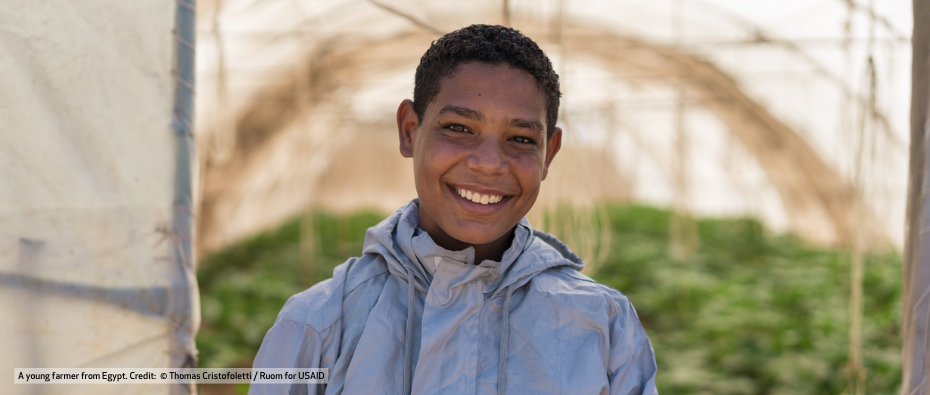Rayan Kassem, West Asia Regional Director at Youth4Nature, highlights youth-led projects for food systems transformation and the ways they can be supported to lead as changemakers.
Food systems challenges are not unique to the Middle East and North Africa (MENA) region, nor are the issues that young people face. But, as with every region, the actions needed to transform them are.
While considering efforts to secure partial self-sufficiency, the MENA region faces food insecurity due to social and political factors, not just environmental. The power to transform the world’s food systems not only lies in governments, but also in people – and in particular– youth. Bringing people together to develop solutions to the problems in food systems is central to youth-led action.
With mobilisation from MENA leaders, youth can be better equipped with adequate financial resources and access to policymakers to face the challenges of food insecurity. International Youth Day is an opportunity to shine a spotlight not only on the key role that youth play in tackling food insecurity in the MENA region, but on the many initiatives that are already doing so worldwide.
Making global solutions work
Taking a ‘one size fits all’ approach – the idea of a singular answer to issues in the food system – would be flawed. Changing dietary patterns, for instance, is commonly offered as a solution. But is this also a solution for those suffering from hunger? Or those that cannot afford nutritious food? In the MENA region, especially, healthy food is unreachable for many.
Instead, a better approach would involve an assessment of the specific needs and challenges of local communities. It also requires understanding the readiness of society to adopt new solutions according to their level of awareness, cultural acceptability and economic resources.
National approaches often exclude local voices from discussions on food systems solutions, concentrating only on increasing food production rather than spurring behavioural shifts. The focus must move from only focusing on increasing global efficiency and production to making food more available and affordable locally. Interventions such as repurposing existing public support, reducing market price controls and repurposing fiscal policies for producers and consumers can address insecurity.
All these emerging opportunities offer youth the ability to shape their futures. Whether at the policy level or on the ground, youth have demonstrated their ability to not only call out what is not working but also to act. Young people continue to demonstrate this and grow the movement to transform the way our global and local food systems work.
Harnessing the power of youth
By fostering decentralised actions that build the capacity of young people to be the changemakers themselves, the world’s food systems can become more efficient and sustainable. Youth empowerment and knowledge has sparked a global collaborative movement for food systems transformation. Among youth leaders, a collective force of sharing skills, influencing behaviour and changing public narratives has grown – and young people in the MENA region are leading the way.
For example, through the support of the UN Major Group for Children and Youth, young people from Egypt, Lebanon, Bahrain, Yemen and other MENA countries have been directly involved in shaping recommendations to policymakers from across the globe. For example, young people have discussed what works and what does not in food systems with world leaders during COP26, the Food Systems Summit and Stockholm+50. The Food Systems Summit, specifically, opened seats for youth among its new Coordination Hub and involved them in all emerging coalitions. The success here is a seat at the table where future policies are being discussed and drafted. This is happening at a national level, too. For the first time, the Lebanese Government has accepted the training of three youth representatives through the Climate Youth Negotiator Programme. They, in turn, will join the country’s official delegation to COP27.
Act4Food Act4Change, a youth-led global campaign, was launched after the UN Food Systems Summit to mobilise young people for food systems transformation. The campaign initiated the “Foodproof project” which aims to increase the resilience of local food systems by teaching communities how to produce their own food through capacity-building workshops, giving them knowledge ownership. The goal is to transform the consumer into a small-scale producer capable of nourishing themselves. The pilot project will be based in a refugee camp in Lebanon.
Real Food Systems, a community advocating for more plant-based food, has initiated an advocacy campaign to promote a sustainable food system approach in national dietary guidelines. The campaign highlights the environmental impacts of a country’s food consumption behaviour to better inform decisions around diets. Lebanon will be its first target in West Asia.
UNICEF has also launched a programme targeting young climate advocates in more than 10 countries worldwide. The initiative aims to strengthen their advocacy capacities and support policy framing on youth and climate change. I, myself, am leading the Lebanese chapter. We are currently supporting 15 youth-led NGOs to plan advocacy around key policy changes.
The number of philanthropies and funds targeting youth-led initiatives is increasing as well. Funding schemes now exist that specifically target youth such as the Global Youth Climate Action Fund, Green Youth Climate Fund Institution and the Children’s Investment Fund Foundation. In addition, the World Food Forum and FAO launched a grant for small- to large-scale projects led by youth to transform food systems. So far, the group has grown to over 100 entrepreneurial candidates. Financial resources such as these are critical to the long-term success of youth-led projects.
Time to act
The UN Food Systems Summit set the standard for youth involvement by creating spaces for them to engage, bringing together the voices of over 100,000 young people and empowering groups from all around the world to sign pledges for change. With adequate finances and support, youth can continue fighting for a just and equitable future – today, on International Youth Day, and every day.



